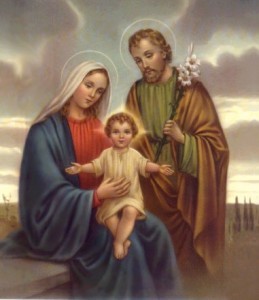Jesus Christ

Jesus Christ
Jesus, God and Man
The second person of the blessed Trinity becomes a man, Jesus Christ. His mother was Mary of Nazareth, daughter of Joachim and Anne. Joseph, Mary‘s husband, was like a father to Jesus, Jesus’ true and only father is God; he had no human father.
Conceived Mary‘s womb by the power of the Holy spirit, Jesus was born in Bethlehem of Judea probably between the years 6 to 4 B.C. He died on Calvary (outside of Old Jerusalem) as a relatively young man, most likely in his early thirties.
He is only one Person, but he has both a divine nature and human nature. He is truly God and he is also truly a human being. As God he has all qualities and attributes of God, As a human, he has a human body, human soul, human mind and will, human imagination and human feelings, His divinity does not overwhelm or interfere with his humanity – and vice versa.
On Calvary he really died; he experienced the same kind of death that all human beings experience. But during his dying, at his death, and after his death, he remained God.
After his death Jesus “descended to the dead.†The older English translation of the creed said “descended into hell†– which means the same thing; Hades, the nether world, region of the dead, the condition of those who had passed on from this life. (This is clear from New Testament references such as 1 peter 3:19f, 4:6; Ephesians 4:9; Romans 10:7; Matthew 12:40; Acts 2:27, Acts 2:27, 31.) Basically, therefore, “descended to the dead “means: Jesus really died and entered among the dead as their savior. Liturgically, Holy Saturday expresses this aspect of the mystery of salvation – the “death†or absence of God.
The prayer of the dying Jesus –“My God, why hast thou forsaken me?†(Mk 15:34) finds its echo in the lives of many Christians. “Descending to the dead†expresses Jesus ‘outcry of agony – his experience of clinging to his Father in his moment of absolute anguish. It also expresses what many Catholics experience as God deepens their love of him by making them realize the hell life is without a sense of his presence.
Jesus rose from the dead on Easter morning. He is living today with his Father and the spirit – and in our midst. He is still both God and man, and always will be.
He lives. And his passage from death to life is the mystery of salvation we are all meant to share.
Christ the revelation and sacrament of God
By his preaching, and by his death and resurrection, Jesus is both the revealer and the revelation of God, who the Father is, is shown in his son, Jesus. As the revelation of God. Jesus is both God’s approach to humankind and our path of God.
Jesus is the ultimate sign of God’s salvation in the world – the center and means of God’s encounter with you. Thus, we call him the original sacrament. The Grace he communicates to you is himself .And through his communication of himself; you receive the total self – communication of God. Jesus is the saving presence of God in the world.
Christ the Center of Your Life
Today Jesus comes to you, actively influencing your life, in various ways, He comes to you in his word – When the word of God is preached to you, or when you read the scriptures with attentive reverence. He is also actively present to you in the seven sacraments – especially in the Eucharist. Another way you meet Jesus is in other people. As we read in the final judgment scene in Gospel of Saint Matthew, “Then the righteous will answer him: ‘Lord, when did we see thee hungry and feed thee, or thirsty and give thee drink?’….And the king will answer them: ‘Truly, I say to you, as you did it to me’ “(Mt 25:37-40).
The Catholic Church believes that Jesus of Nazareth is the center of our lives and destiny. In its document The Church in the Modern World, Vatican Council II affirms that Jesus is “the key ,the focal point, and the goal of the human history†(Church in the Modern World, God find their Yes in him†(2 Cor 1:20)..
